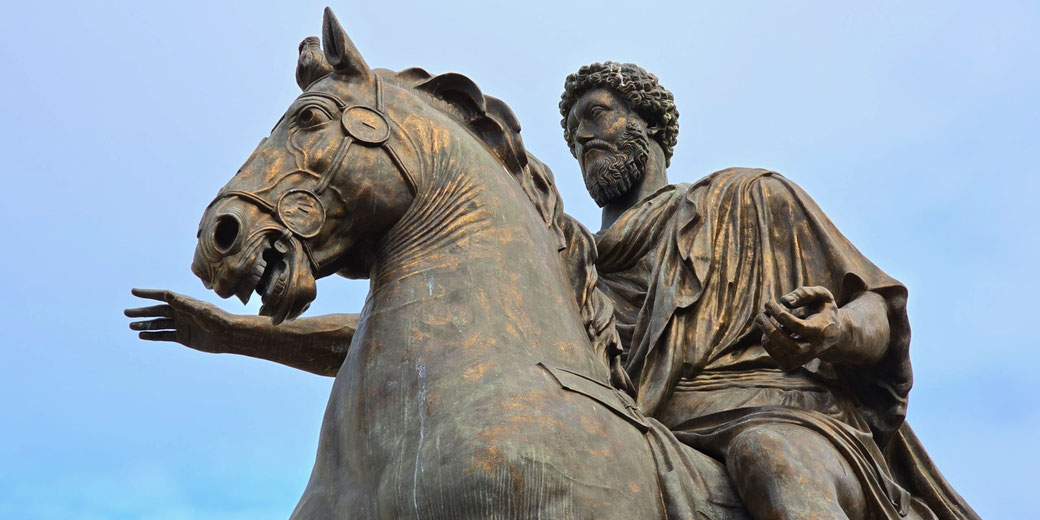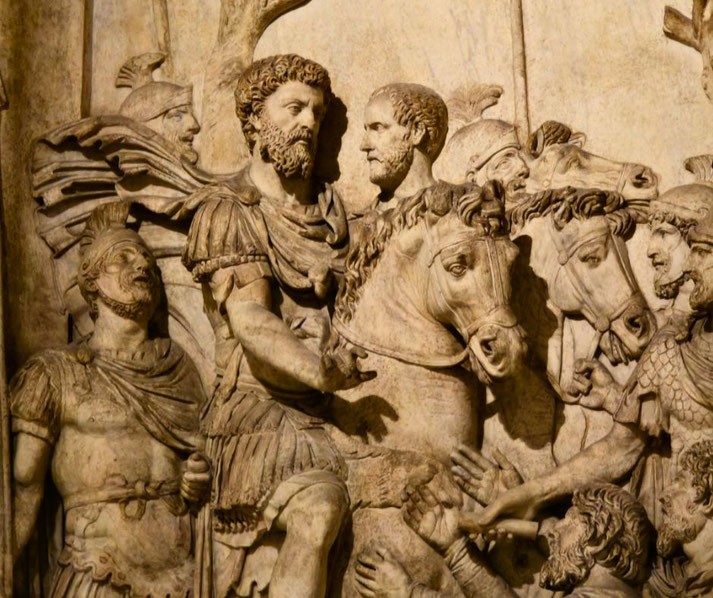Was Marcus Aurelius, the 'philosopher emperor', the greatest ruler in Roman history?

Marcus Aurelius, known as the philosopher-king, demonstrated a rare blend of military prowess, administrative skill, and deep philosophical thought during his time on the throne.
As Emperor, he navigated the vast Roman Empire through times of strife and plague, all the while penning thoughts that would resonate through millennia.
But who was this man who led one of history's greatest empires while pondering life's profoundest questions?
How did his stoic beliefs shape his rule?
And how did they help manage a crisis that threatened to unravel the fabric of Roman society?
Born to rule?
Marcus Aurelius, born on April 26, 121 AD, in Rome, embarked on a life journey that was remarkable from the start.
His birth into a patrician family positioned him in a world of privilege and power.
His father, Marcus Annius Verus, died when Marcus was only a few years old, leaving him in the care of his grandfather.
This early loss brought a sense of solemnity to his childhood, but it also opened doors to influential mentors.
Among them was the Emperor Hadrian, who noticed the young Marcus' potential and ensured his elevation to the Equestrian order in 136 AD.
His education was thorough and diverse, a blend of physical training and academic study.
Marcus was instructed in Latin and Greek literature, learning from notable teachers like Herodes Atticus and Marcus Cornelius Fronto.
However, what set Marcus apart was his early interest in philosophy, especially Stoicism.
This interest was kindled around the age of 12, marking the beginning of a lifelong pursuit of philosophical wisdom.
How Marcus Aurelius became emperor
In a pivotal turn of events, Hadrian's successor, Antoninus Pius, adopted Marcus in 138 AD, following Hadrian's explicit wish.
Following his adoption in 138 AD by Emperor Antoninus Pius, Marcus was groomed for leadership.
He was given honours and responsibilities gradually, ensuring a smooth transition of power when the time came.
In 140 AD, he was made consul, a significant step in his political career, and later, in 145 AD, he married Faustina the Younger, further solidifying his position in the imperial family.
Antoninus Pius involved him in imperial administration, giving him insights into the workings of the empire.
This period was crucial in shaping Marcus’ understanding of governance and his philosophy towards ruling.
His stoic principles, which emphasized duty, discipline, and the welfare of the people, were honed during these years, influencing his later decisions as emperor.
In 161 AD, the death of Antoninus Pius set the stage for Marcus’ elevation to the throne.
In a departure from tradition, he insisted that his adoptive brother, Lucius Verus, be made co-emperor, a decision that demonstrated his commitment to shared power and responsibility.
This was a time of relative peace for the Roman Empire, but it was soon disrupted by military conflicts and the Antonine Plague.
The horrific outbreak of the Antonine Plague
The Antonine Plague, a devastating epidemic, struck the Roman Empire during the reign of Marcus Aurelius, around 165 AD, and persisted in waves until approximately 180 AD.
Thought to have been either smallpox or measles, the plague was brought back to Rome by soldiers returning from campaigns in the Near East.
Its impact was catastrophic, with estimates suggesting that at its peak, the plague claimed the lives of up to 2,000 people per day in Rome alone, and it decimated the Roman army.
The outbreak coincided with a period of military conflict, notably the Marcomannic Wars, complicating the empire's response to both the military and health crises.
The plague not only caused widespread death but also led to a severe labor shortage across the empire, affecting agriculture, industry, and the military.
The economic impact was profound, as the workforce dwindled and the cost of labor soared.
Marcus Aurelius, in response to this crisis, took several measures to manage the situation.
He recruited slaves and gladiators into the army to counteract the manpower shortage.
To alleviate the economic strain, he auctioned off imperial possessions in the Forum of Trajan.
His leadership during this period was marked by attempts to maintain stability and order, even as the empire faced one of its most significant challenges.
How did his Stoic philosophy help him?
Stoicism, founded in Athens by Zeno of Citium in the early 3rd century BC, taught that a life of virtue, in accordance with reason and nature, was the path to true happiness.
For Marcus, this philosophy was not just theoretical but a practical guide for life and governance.
Central to Stoic philosophy are the concepts of "logos," "apatheia," and "eudaimonia." "Logos" refers to the universal reason or the rational structure of the universe.
Marcus believed in the presence of a rational order in the cosmos, to which humans must align themselves.
He saw the universe as an organism where everything is interconnected, and every individual's duty is to play their part.
"Apatheia," or freedom from passion, is another cornerstone of Stoicism. It doesn't mean the absence of emotions but rather suggests freedom from irrational and destructive emotions.
Marcus Aurelius strived for this state, seeking to respond to events with rationality and calm, regardless of personal feelings.
"Eudaimonia," meaning a state of good spirit or flourishing, is the ultimate goal in Stoicism.
For Marcus, achieving eudaimonia meant living in harmony with reason and virtue, embodying the qualities of wisdom, courage, justice, and temperance.
His writings in "Meditations" reflect these ideals, offering insights into his personal struggles and thoughts as he attempted to live by these principles.
Marcus Aurelius' adoption of Stoicism also shaped his approach to governance.
He viewed his role as emperor as an opportunity to embody Stoic virtues, particularly justice and service to the people.
His reign was marked by efforts to improve the lives of his subjects and administer the empire with fairness and competence.
Despite the challenges of his time, including wars and the Antonine Plague, he remained committed to these principles, striving to balance his responsibilities as a ruler with the pursuit of philosophical wisdom.
How successful was he as emperor?
Unlike many of his predecessors, Marcus Aurelius was not enticed by the trappings of power but viewed his role as a service to the state.
This perspective was reflected in his efforts to improve the legal system, ensuring fairness and protecting the vulnerable, such as slaves and orphans.
He also reduced the games and spectacles that were typical of previous emperors, redirecting resources towards more beneficial public projects.
During his reign, Marcus Aurelius faced continuous warfare along the Roman borders.
The most notable were the Marcomannic Wars, a series of conflicts against Germanic tribes and other groups along the Danube frontier.
These wars were not only significant military campaigns but also tested his leadership and strategic abilities.
Despite being a man of peace and philosophy, he proved to be a capable military leader, successfully defending the empire's boundaries and securing peace through diplomatic negotiations.

What we know about his personal life
His marriage to Faustina the Younger in 145 AD was both a political alliance and a personal union, which produced 13 children, although many did not survive into adulthood.
Faustina herself was a prominent figure in Roman society and played a significant role in Marcus' life.
Despite rumors and controversies surrounding her character and fidelity, Marcus remained devoted to her and after her death in 175 AD, he had her deified and honored with a temple.
His love and respect for Faustina were evident, reflecting the deep personal bonds that underpinned his public persona.
His relationship with his children, particularly his son Commodus, who would succeed him as emperor, was a significant aspect of his personal life.
Despite his efforts, Commodus did not share his father's Stoic ideals or administrative capabilities.
Apart from his immediate family, Marcus Aurelius maintained relationships with several prominent figures of his time, including his teachers and advisors.
He continued to correspond with his rhetoric teacher, Marcus Cornelius Fronto, and his close bond with his adoptive brother, Lucius Verus, was notable, especially their joint rule until Verus’ death in 169 AD.
Marcus Aurelius' death and the problem of succession
Marcus Aurelius' life came to an end in 180 AD, during a campaign at Vindobona (modern-day Vienna) against the Germanic tribes.
While the exact cause of his death is uncertain, it is widely believed that he died of natural causes, possibly the plague that had ravaged the empire for years.
His death marked the end of a reign characterized by philosophical introspection and diligent governance amidst challenging times.
Following his death, the throne passed to his son Commodus, whom Marcus had named as co-emperor in 177 AD.
This succession was a significant departure from the precedent of adopting capable and experienced men as successors, a practice that had contributed to a period of stability and prosperity known as the era of the Five Good Emperors.
Commodus, in contrast to his father, lacked the same dedication to administrative duties and philosophical ideals.
His rule, which lasted until 192 AD, was marked by political turmoil and is often considered the beginning of the decline of the Roman Empire.
The decision by Marcus Aurelius to appoint his biological son as his successor has been a point of debate among historians.
Some argue that this decision stemmed from his belief in the hereditary right to the throne, while others suggest it was a lapse in judgment, possibly influenced by his affection for his son.
Commodus' reign, characterized by extravagance and cruelty, stood in stark contrast to the principled and duty-bound rule of Marcus Aurelius.
What do you need help with?
Download ready-to-use digital learning resources
Copyright © History Skills 2014-2025.
Contact via email
With the exception of links to external sites, some historical sources and extracts from specific publications, all content on this website is copyrighted by History Skills. This content may not be copied, republished or redistributed without written permission from the website creator. Please use the Contact page to obtain relevant permission.





